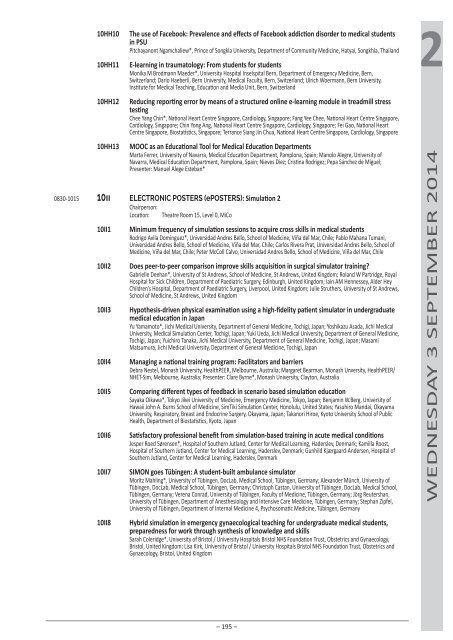AbNXb
AbNXb
AbNXb
You also want an ePaper? Increase the reach of your titles
YUMPU automatically turns print PDFs into web optimized ePapers that Google loves.
2WEDNESDAY 3 SEPTEMBER 2014<br />
10HH10<br />
10HH11<br />
10HH12<br />
10HH13<br />
The use of Facebook: Prevalence and effects of Facebook addiction disorder to medical students<br />
in PSU<br />
Pitchayanont Ngamchaliew*, Prince of Songkla University, Department of Community Medicine, Hatyai, Songkhla, Thailand<br />
E-learning in traumatology: From students for students<br />
Monika M Brodmann Maeder*, University Hospital Inselspital Bern, Department of Emergency Medicine, Bern,<br />
Switzerland; Dario Haeberli, Bern University, Medical Faculty, Bern, Switzerland; Ulrich Woermann, Bern University,<br />
Institute for Medical Teaching, Education and Media Unit, Bern, Switzerland<br />
Reducing reporting error by means of a structured online e-learning module in treadmill stress<br />
testing<br />
Chee Yang Chin*, National Heart Centre Singapore, Cardiology, Singapore; Fang Yee Chee, National Heart Centre Singapore,<br />
Cardiology, Singapore; Chin Yong Ang, National Heart Centre Singapore, Cardiology, Singapore; Fei Gao, National Heart<br />
Centre Singapore, Biostatistics, Singapore; Terrance Siang Jin Chua, National Heart Centre Singapore, Cardiology, Singapore<br />
MOOC as an Educational Tool for Medical Education Departments<br />
Marta Ferrer, University of Navarra, Medical Education Department, Pamplona, Spain; Manolo Alegre, University of<br />
Navarra, Medical Education Department, Pamplona, Spain; Nieves Diez; Cristina Rodrigez; Pepa Sánchez de Miguel;<br />
Presenter: Manuel Alege Esteban*<br />
0830-1015 10II ELECTRONIC POSTERS (ePOSTERS): Simulation 2<br />
Chairperson:<br />
Location: Theatre Room 15, Level 0, MiCo<br />
10II1<br />
10II2<br />
10II3<br />
10II4<br />
10II5<br />
10II6<br />
10II7<br />
10II8<br />
Minimum frequency of simulation sessions to acquire cross skills in medical students<br />
Rodrigo Avila Dominguez*, Universidad Andres Bello, School of Medicine, Viña del Mar, Chile; Pablo Mahana Tumani,<br />
Universidad Andres Bello, School of Medicine, Viña del Mar, Chile; Carlos Rivera Prat, Universidad Andres Bello, School of<br />
Medicine, Viña del Mar, Chile; Peter McColl Calvo, Universidad Andres Bello, School of Medicine, Viña del Mar, Chile<br />
Does peer-to-peer comparison improve skills acquisition in surgical simulator training<br />
Gabrielle Deehan*, University of St Andrews, School of Medicine, St Andrews, United Kingdom; Roland W Partridge, Royal<br />
Hospital for Sick Children, Department of Paediatric Surgery, Edinburgh, United Kingdom; Iain AM Hennessey, Alder Hey<br />
Children’s Hospital, Department of Paediatric Surgery, Liverpool, United Kingdom; Julie Struthers, University of St Andrews,<br />
School of Medicine, St Andrews, United Kingdom<br />
Hypothesis-driven physical examination using a high-fidelity patient simulator in undergraduate<br />
medical education in Japan<br />
Yu Yamamoto*, Jichi Medical University, Department of General Medicine, Tochigi, Japan; Yoshikazu Asada, Jichi Medical<br />
University, Medical Simulation Center, Tochigi, Japan; Yuki Ueda, Jichi Medical University, Department of General Medicine,<br />
Tochigi, Japan; Yuichiro Tanaka, Jichi Medical University, Department of General Medicine, Tochigi, Japan; Masami<br />
Matsumura, Jichi Medical University, Department of General Medicine, Tochigi, Japan<br />
Managing a national training program: Facilitators and barriers<br />
Debra Nestel, Monash University, HealthPEER, Melbourne, Australia; Margaret Bearman, Monash Unversity, HealthPEER/<br />
NHET-Sim, Melbourne, Australia; Presenter: Clare Byrne*, Monash University, Clayton, Australia<br />
Comparing different types of feedback in scenario based simulation education<br />
Sayaka Oikawa*, Tokyo Jikei University of Medicine, Emergency Medicine, Tokyo, Japan; Benjamin W.Berg, University of<br />
Hawaii John A. Burns School of Medicine, SimTiki Simulation Center, Honolulu, United States; Yasuhiro Mandai, Okayama<br />
University, Respiratory, Breast and Endocrine Surgery, Okayama, Japan; Takanori Hiroe, Kyoto University School of Public<br />
Health, Department of Biostatistics, Kyoto, Japan<br />
Satisfactory professional benefit from simulation-based training in acute medical conditions<br />
Jesper Roed Sørensen*, Hospital of Southern Jutland, Center for Medical Learning, Haderslev, Denmark; Kamilla Roost,<br />
Hospital of Southern Jutland, Center for Medical Learning, Haderslev, Denmark; Gunhild Kjærgaard-Andersen, Hospital of<br />
Southern Jutland, Center for Medical Learning, Haderslev, Denmark<br />
SIMON goes Tübingen: A student-built ambulance simulator<br />
Moritz Mahling*, University of Tübingen, DocLab, Medical School, Tübingen, Germany; Alexander Münch, University of<br />
Tübingen, DocLab, Medical School, Tübingen, Germany; Christoph Castan, University of Tübingen, DocLab, Medical School,<br />
Tübingen, Germany; Verena Conrad, University of Tübingen, Faculty of Medicine, Tübingen, Germany; Jörg Reutershan,<br />
University of Tübingen, Department of Anesthesiology and Intensive Care Medicine, Tübingen, Germany; Stephan Zipfel,<br />
University of Tübingen, Department of Internal Medicine 4, Psychosomatic Medicine, Tübingen, Germany<br />
Hybrid simulation in emergency gynaecological teaching for undergraduate medical students,<br />
preparedness for work through synthesis of knowledge and skills<br />
Sarah Coleridge*, University of Bristol / University Hospitals Bristol NHS Foundation Trust, Obstetrics and Gynaecology,<br />
Bristol, United Kingdom; Lisa Kirk, University of Bristol / University Hospitals Bristol NHS Foundation Trust, Obstetrics and<br />
Gynaecology, Bristol, United Kingdom<br />
– 195 –


